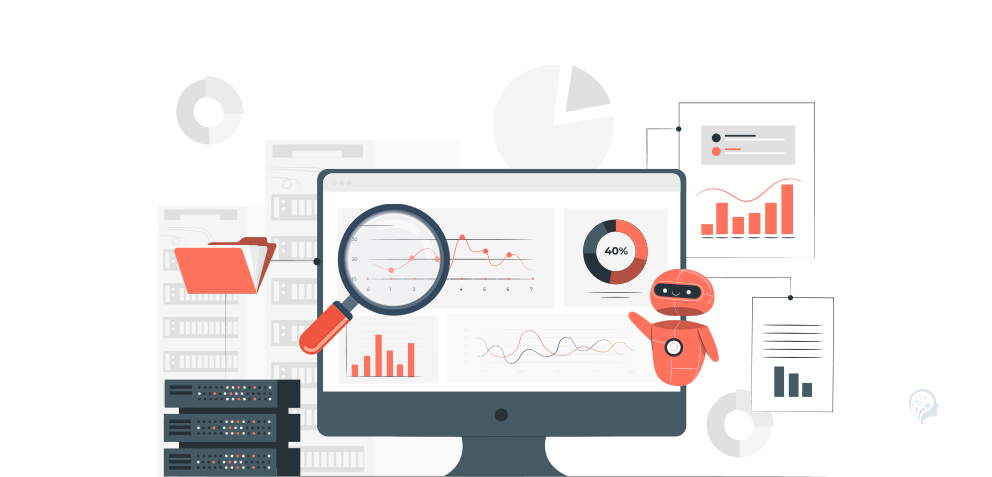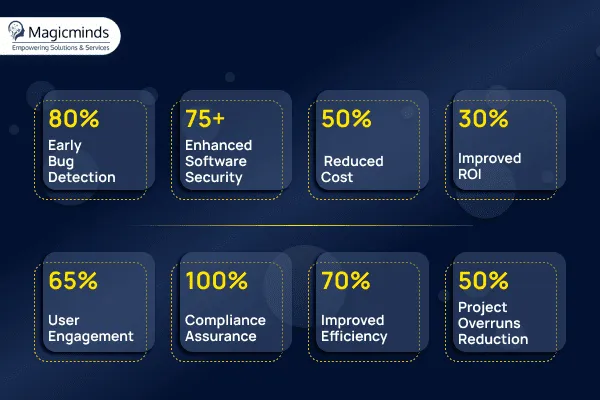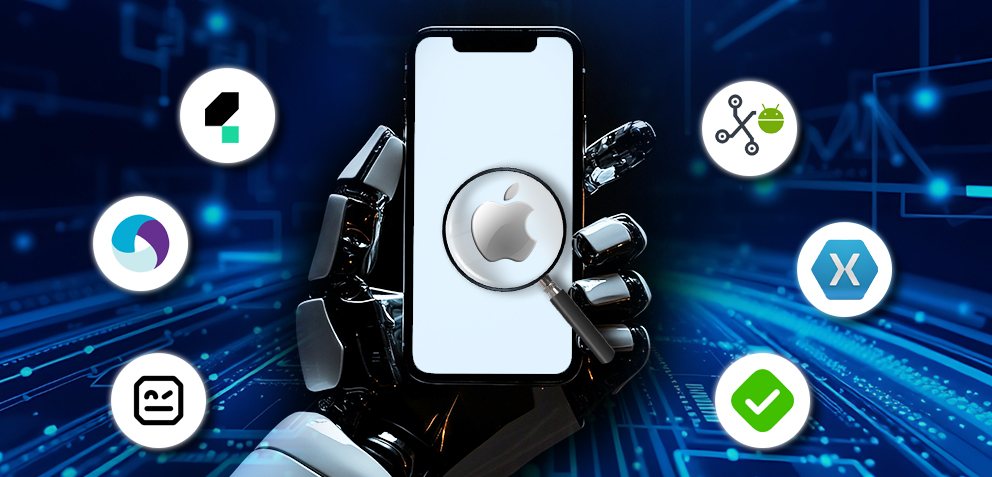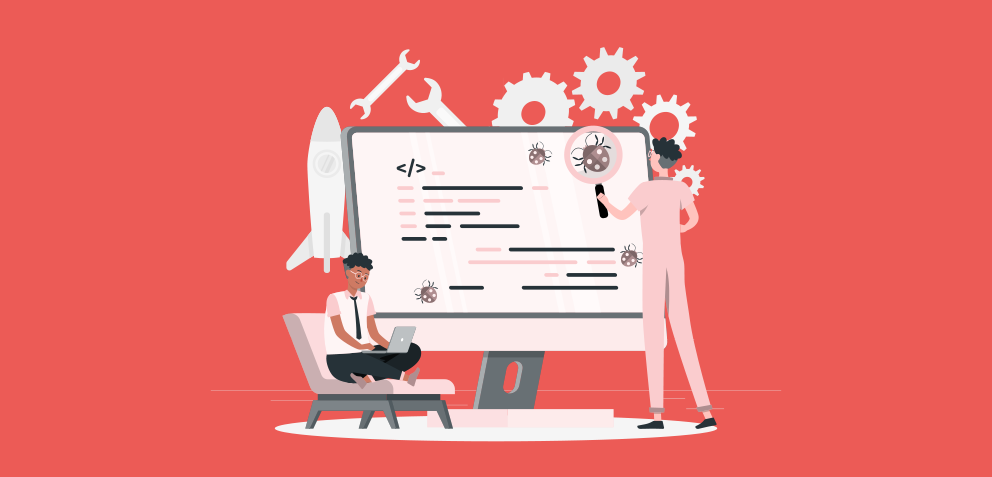Unlock the Power of AI in Software Testing

Table Of Contents
 Stay In-the-loop
Stay In-the-loop
Get fresh tech & marketing insights delivered right to your inbox.
Share this Article
Tags
Category
- .Net Developer
- Adtech
- Android App Development
- API
- App Store
- Artificial Intelligence
- Blockchain Development
- Chatbot Development
- CMS Development
- Cybersecurity
- Data Security
- Dedicated Developers
- Digital Marketing
- Ecommerce Development
- Edtech
- Fintech
- Flutter app development
- Full Stack Development
- Healthcare Tech
- Hybrid App Development
- iOS App Development
- IT Project Management
- JavaScript development
- Laravel Development
- Magento Development
- MEAN Stack Developer
- MERN Stack Developer
- Mobile App
- Mobile App Development
- Nodejs Development
- Progressive Web Application
- python development
- QA and testing
- Quality Engineering
- React Native
- SaaS
- SEO
- Shopify Development
- Software Development
- Software Outsourcing
- Staff Augmentation
- UI/UX Development
- Web analytics tools
- Wordpress Development
With AI dominating almost every industry globally, its impact on IT is increasing daily. In terms of Software testing, AI has enhanced the efficiency and accuracy of software testing by utilizing machine learning and Automation. AI helps analyze huge amounts of data, identify user patterns, predict potential threats, and generate test cases more effectively than traditional methods.
In QA, AI-enhanced automation tools help testers adjust to changes in application features and user behavior, improving test coverage and response time. They also automate repetitive tasks, reducing manual effort and human error.
This article aims to explore AI’s potential in software testing. So, what’re you waiting for? Let’s get started!
AI in Software Testing: Brief Understanding
AI is revolutionizing software testing. It’s the intelligent automation of testing processes powered by machine learning and data analytics. Imagine AI crafting test cases, executing them, and analyzing results, all without human intervention.
This not only speeds up testing but also boosts accuracy and efficiency. From identifying potential defects to predicting system behavior, AI transforms quality assurance into a proactive, data-driven function. AI in software testing is about making testing smarter, faster, and more reliable.
Types of AI Testing
- Unit Testing: Analyzes code structure to identify potential issues like unused variables or unreachable code. Generates unit test cases based on code coverage metrics.
- Functional Testing: Learns user behavior patterns and automatically generates functional test cases. Compares application outputs with expected results to identify functional defects.
- Non-Functional Testing: Used for performance testing by simulating user load and analyzing application response times. Helps with security testing by identifying vulnerabilities in code and configuration.
- Automation Testing: Automates repetitive test tasks like data entry and test script execution. Self-heals automation scripts when UI elements change, reducing maintenance effort.
- Visual Testing: This tool uses image recognition to compare screenshots and detect UI inconsistencies and visual regressions. It also automates visual testing across different devices and resolutions.
ALSO READ: Maximize QA Efficiency with the Power of Automation Testing
Top 5 Role of AI in Software Testing
The use of AI in software testing has become very important because of its effectiveness and ability to deliver results effectively and in a much reduced time. Companies can now improve the overall quality of their application by automating regression suites and getting a faster release cycle. Also, AI helps companies to find and eliminate potential issues before they become costly affairs. In short, AI has become a must-have technology if companies want to streamline their testing process and get quality products in a very short time.
Some key points that make AI a must for companies are mentioned below.
#1 Test Case Generation and Optimization
AI plays a vital role in test case generation and Optimization by automating the creation of test cases based on historical data and changing patterns in an application. It also analyzes human behavior patterns and code changes to create relevant test scenarios, which reduces manual effort and test coverage gaps. AI optimizes the test suites by focusing on high-risk modules and removing duplicate test cases, which leads to effective testing and improved product quality.
#2 Predicting Potential Threats
AI can predict areas more prone to risks by learning from past data, change patterns, and human behavior. These predictions are important for testers to know where to focus. Since the bugs are predicted, testers can identify them quickly and reduce the effort and time needed for the testing process.
#3 Maintenance of Test cases smartly
AI-driven tools that automatically update the test cases based on the application’s changes help testers maintain them more efficiently. This ensures that the test cases stay relevant and useful even after the application keeps evolving.
#4 Defect Tracking and Management
AI helps in defect tracking and management by automating the identification and classification process and prioritizing bugs. AI-enhanced tools can categorize the bugs and even generate reports automatically. This improves the response time, reduces human errors, and ensures immediate resolution, ensuring a higher quality and more streamlined defect management process.
#5 Performance Testing
Performance testing is essential in handling different load types under given conditions. AI can enhance this by simulating user behavior more realistically and analyzing the performance metrics simultaneously. AI-driven tools can effectively determine the blockers and also suggest the solution required to make the application run smoothly.
Accelerate Your Testing, Amplify Your Success with AI-Driven Testing of Magicminds!
Future Trends in AI Testing
#1 Predictive Testing
Predictive testing in AI uses advanced machine learning models to determine potential threats before they lead to failure. AI models use algorithms to identify and address issues, allowing users to make preventive fixes rather than reactive fixes.
#2 Advanced Analytics
AI testing will emphasize Advanced analytics to enhance accuracy and efficiency. AI can process huge amounts of data to gain insight and build patterns that generate more accurate testing strategies. This will improve overall decision-making by providing detailed information.
#3 Quantum Computing
This set to transform AI testing as it offers exponentially greater processing power. It enables the stimulation and analysis of highly complex scenarios that are hard to determine with traditional testing methods. It takes on unattainable scenarios, thus providing deeper insights with more accurate test results.
#4 Ethical AI Testing
This will involve developing guidelines that ensure that AI systems are tested and used in a way that upholds ethical standards. Ethical AI frameworks will prioritize the use of AI with responsibility and ensure that there are no biases in decision-making, which will ensure fairness and transparency. This change will gain trust and accountability in using AI technology.
#5 No/Low Code Testing
This is going to boost in the near future as it simplifies test creation and execution. This platform empowers users to design and implement tests without having great programming skills, using an intuitive visual interface and automation. This accelerates the entire testing process, reduces dependency on specialized skills, and makes AI testing more accessible.
READ MORE: Embrace AI for Superior Mobile App Security Testing Solutions
Challenges of AI in Software Testing
Let’s understand the challenges that come with AI.
Data
We must consider data-related challenges for effective AI-driven testing, including the quality and variety of testing data. Biased or incomplete data can lead to inaccurate predictions and data outcomes. Also, managing a huge data set can lead to data privacy and security concerns.
Skill and Expertise
One of the main challenges in AI for software Testing is the need for specialized skill and expertise. Users need an in-depth understanding of the testing process and machine learning to develop, manage, and implement AI-driven testing solutions. Currently, there is a need for more individuals with the necessary expertise to develop, train, and upgrade AI models effectively.
Integration with Existing Tools
Integrating AI into existing tools brings many challenges, such as compatibility issues, data quality and integrity issues, and the complexity of customizing AI models. Integrating AI might interrupt the existing workflow and require maintenance until it adapts to the existing setup.
Cost and Investment
Implementing AI in software testing can be costly due to the high initial investment in AI automation tools and infrastructure and the expense of resources with AI-specialized expertise. Maintaining and updating the AI solution with the existing model can also increase the cost. These costs will be challenging to justify if the ROI needs to be clarified. There might be some hidden costs as well in the training of the staff.
Regulatory and Compliance Issues
AI systems must adhere to updated laws and standards, such as GDPR for data protection and Fairless guidelines. AI testing should ensure that the systems meet all ethical and legal requirements, including bias mitigation and transparency. To meet compliance, systems need documentation and traceability to demonstrate adherence to regulations, which is complex as regulations keep on updating and often need to catch up to technological advancement.
Adversarial Attacks
The AI systems should be robust enough to handle incorrect inputs created intentionally to make wrong predictions and decisions. Testing must include scenarios where inputs are manipulated to assess the AI model’s robustness and resilience. AI systems should be robust enough to handle adversarial attacks and ensure reliability and security.
Conquer AI testing Complexities With Our Expert Solutions!
Get in Touch with Us!The Future of AI in Software Testing
Although it brings some challenges to software testing, AI is transforming the test automation world. What better proof can there be than AI’s prominent future? Let’s understand what the future of AI in software testing holds:
Continuous Testing using AI
In AI-driven continuous testing, AI provides seamless integration into development pipelines. Using advanced learning algorithms to adapt to changes in software behavior, AI optimizes test strategies and responds to code changes more efficiently. AI’s ability to predict and address potential issues by analyzing huge data sets has enhanced software testing quality.
Cognitive Automation
Cognitive automation is a part of AI, and systems can learn and adapt like humans. This enhances the creation of test cases and the detection of bugs through advanced pattern recognition and contextual understanding. Cognitive Automation can handle complex scenarios, understand human inputs, and provide useful insights to help decision-making.
CI/CD Pipelines Integration
AI can automate and optimize the entire pipeline stage from continuous integration to deployment. This helps in faster bug identification and smooth code change adaptation. AI manages test execution, prioritizes impact areas, and analyzes test reports in real-time, ensuring that the software consistently delivers at high quality and speed throughout the development cycle.
RELATED READ: Appium vs. Cypress: Which Is The Best Tool For Test Automation?
Experience Magicminds Difference in AI-driven Software Testing!
AI is all set to change the traditional way of testing. Through machine learning, it will minimize manual intervention, automatically detect bugs, predict issues, and resolve them before they can cause harm, thus saving lots of time and money.
Utilizing AI-driven testing methods puts companies in a great position to lead the competitive app market by delivering high-quality solutions that meet or exceed user expectations.
However, many companies find it difficult to handle the complexity of AI-driven software testing. We can help if you’re one of them and are just starting out. Magicminds offers the best AI-driven software testing services available, ensuring that your app is flawless and functions without a hitch quickly.

Partner with us to embrace the gateway toward unparalleled app quality. Don’t wait; grab the opportunity today! Contact Us!
With AI dominating almost every industry globally, its impact on IT is increasing daily. In terms of Software testing, AI has enhanced the efficiency and accuracy of software testing by utilizing machine learning and Automation. AI helps analyze huge amounts of data, identify user patterns, predict potential threats, and generate test cases more effectively than traditional methods. In QA, AI-enhanced automation tools help testers adjust to changes in application features and user behavior, improving test coverage and response time. They also automate repetitive tasks, reducing manual effort and human error. This article aims to explore AI’s potential in software testing. So, what’re you waiting for? Let’s get started!
| Table of Contents!
Types of AI Testing Top 5 Role of AI in Software Testing Future Trends in AI Testing Challenges of AI in Software Testing The Future of AI in Software Testing Experience Magicminds Difference in AI-driven Software Testing! |
AI in Software Testing: Brief Understanding
AI is revolutionizing software testing. It’s the intelligent automation of testing processes powered by machine learning and data analytics. Imagine AI crafting test cases, executing them, and analyzing results, all without human intervention.
This not only speeds up testing but also boosts accuracy and efficiency. From identifying potential defects to predicting system behavior, AI transforms quality assurance into a proactive, data-driven function. AI in software testing is about making testing smarter, faster, and more reliable.
Types of AI Testing
- Unit Testing: Analyzes code structure to identify potential issues like unused variables or unreachable code. Generates unit test cases based on code coverage metrics.
- Functional Testing: Learns user behavior patterns and automatically generates functional test cases. Compares application outputs with expected results to identify functional defects.
- Non-Functional Testing: Used for performance testing by simulating user load and analyzing application response times. Helps with security testing by identifying vulnerabilities in code and configuration.
- Automation Testing: Automates repetitive test tasks like data entry and test script execution. Self-heals automation scripts when UI elements change, reducing maintenance effort.
- Visual Testing: This tool uses image recognition to compare screenshots and detect UI inconsistencies and visual regressions. It also automates visual testing across different devices and resolutions.
ALSO READ: Maximize QA Efficiency with the Power of Automation Testing
Top 5 Role of AI in Software Testing
The use of AI in software testing has become very important because of its effectiveness and ability to deliver results effectively and in a much reduced time. Companies can now improve the overall quality of their application by automating regression suites and getting a faster release cycle. Also, AI helps companies to find and eliminate potential issues before they become costly affairs. In short, AI has become a must-have technology if companies want to streamline their testing process and get quality products in a very short time.
Some key points that make AI a must for companies are mentioned below.
#1 Test Case Generation and Optimization
AI plays a vital role in test case generation and Optimization by automating the creation of test cases based on historical data and changing patterns in an application. It also analyzes human behavior patterns and code changes to create relevant test scenarios, which reduces manual effort and test coverage gaps. AI optimizes the test suites by focusing on high-risk modules and removing duplicate test cases, which leads to effective testing and improved product quality.
#2 Predicting Potential Threats
AI can predict areas more prone to risks by learning from past data, change patterns, and human behavior. These predictions are important for testers to know where to focus. Since the bugs are predicted, testers can identify them quickly and reduce the effort and time needed for the testing process.
#3 Maintenance of Test cases smartly
AI-driven tools that automatically update the test cases based on the application’s changes help testers maintain them more efficiently. This ensures that the test cases stay relevant and useful even after the application keeps evolving.
#4 Defect Tracking and Management
AI helps in defect tracking and management by automating the identification and classification process and prioritizing bugs. AI-enhanced tools can categorize the bugs and even generate reports automatically. This improves the response time, reduces human errors, and ensures immediate resolution, ensuring a higher quality and more streamlined defect management process.
#5 Performance Testing
Performance testing is essential in handling different load types under given conditions. AI can enhance this by simulating user behavior more realistically and analyzing the performance metrics simultaneously. AI-driven tools can effectively determine the blockers and also suggest the solution required to make the application run smoothly.
| Accelerate Your Testing, Amplify Your Success with AI-Driven Testing of Magicminds! Explore More |
Future Trends in AI Testing
#1 Predictive Testing
Predictive testing in AI uses advanced machine learning models to determine potential threats before they lead to failure. AI models use algorithms to identify and address issues, allowing users to make preventive fixes rather than reactive fixes.
#2 Advanced Analytics
AI testing will emphasize Advanced analytics to enhance accuracy and efficiency. AI can process huge amounts of data to gain insight and build patterns that generate more accurate testing strategies. This will improve overall decision-making by providing detailed information.
#3 Quantum Computing
This set to transform AI testing as it offers exponentially greater processing power. It enables the stimulation and analysis of highly complex scenarios that are hard to determine with traditional testing methods. It takes on unattainable scenarios, thus providing deeper insights with more accurate test results.
#4 Ethical AI Testing
This will involve developing guidelines that ensure that AI systems are tested and used in a way that upholds ethical standards. Ethical AI frameworks will prioritize the use of AI with responsibility and ensure that there are no biases in decision-making, which will ensure fairness and transparency. This change will gain trust and accountability in using AI technology.
#5 No/Low Code Testing
This is going to boost in the near future as it simplifies test creation and execution. This platform empowers users to design and implement tests without having great programming skills, using an intuitive visual interface and automation. This accelerates the entire testing process, reduces dependency on specialized skills, and makes AI testing more accessible.
READ MORE: Embrace AI for Superior Mobile App Security Testing Solutions
Challenges of AI in Software Testing
Let’s understand the challenges that come with AI.
Data
We must consider data-related challenges for effective AI-driven testing, including the quality and variety of testing data. Biased or incomplete data can lead to inaccurate predictions and data outcomes. Also, managing a huge data set can lead to data privacy and security concerns.
Skill and Expertise
One of the main challenges in AI for software Testing is the need for specialized skill and expertise. Users need an in-depth understanding of the testing process and machine learning to develop, manage, and implement AI-driven testing solutions. Currently, there is a need for more individuals with the necessary expertise to develop, train, and upgrade AI models effectively.
Integration with Existing Tools
Integrating AI into existing tools brings many challenges, such as compatibility issues, data quality and integrity issues, and the complexity of customizing AI models. Integrating AI might interrupt the existing workflow and require maintenance until it adapts to the existing setup.
Cost and Investment
Implementing AI in software testing can be costly due to the high initial investment in AI automation tools and infrastructure and the expense of resources with AI-specialized expertise. Maintaining and updating the AI solution with the existing model can also increase the cost. These costs will be challenging to justify if the ROI needs to be clarified. There might be some hidden costs as well in the training of the staff.
Regulatory and Compliance Issues
AI systems must adhere to updated laws and standards, such as GDPR for data protection and Fairless guidelines. AI testing should ensure that the systems meet all ethical and legal requirements, including bias mitigation and transparency. To meet compliance, systems need documentation and traceability to demonstrate adherence to regulations, which is complex as regulations keep on updating and often need to catch up to technological advancement.
Adversarial Attacks
The AI systems should be robust enough to handle incorrect inputs created intentionally to make wrong predictions and decisions. Testing must include scenarios where inputs are manipulated to assess the AI model’s robustness and resilience. AI systems should be robust enough to handle adversarial attacks and ensure reliability and security.
| Conquer AI testing Complexities With Our Expert Solutions! Get in Touch with Us! |
The Future of AI in Software Testing
Although it brings some challenges to software testing, AI is transforming the test automation world. What better proof can there be than AI’s prominent future? Let’s understand what the future of AI in software testing holds:
Continuous Testing using AI
In AI-driven continuous testing, AI provides seamless integration into development pipelines. Using advanced learning algorithms to adapt to changes in software behavior, AI optimizes test strategies and responds to code changes more efficiently. AI’s ability to predict and address potential issues by analyzing huge data sets has enhanced software testing quality.
Cognitive Automation
Cognitive automation is a part of AI, and systems can learn and adapt like humans. This enhances the creation of test cases and the detection of bugs through advanced pattern recognition and contextual understanding. Cognitive Automation can handle complex scenarios, understand human inputs, and provide useful insights to help decision-making.
CI/CD Pipelines Integration
AI can automate and optimize the entire pipeline stage from continuous integration to deployment. This helps in faster bug identification and smooth code change adaptation. AI manages test execution, prioritizes impact areas, and analyzes test reports in real-time, ensuring that the software consistently delivers at high quality and speed throughout the development cycle.
RELATED READ: Appium vs. Cypress: Which Is The Best Tool For Test Automation?
Experience Magicminds Difference in AI-driven Software Testing!
AI is all set to change the traditional way of testing. Through machine learning, it will minimize manual intervention, automatically detect bugs, predict issues, and resolve them before they can cause harm, thus saving lots of time and money.
Utilizing AI-driven testing methods puts companies in a great position to lead the competitive app market by delivering high-quality solutions that meet or exceed user expectations.
However, many companies find it difficult to handle the complexity of AI-driven software testing. We can help if you’re one of them and are just starting out. Magicminds offers the best AI-driven software testing services available, ensuring that your app is flawless and functions without a hitch quickly.
Partner with us to embrace the gateway toward unparalleled app quality. Don’t wait; grab the opportunity today! Contact Us!


